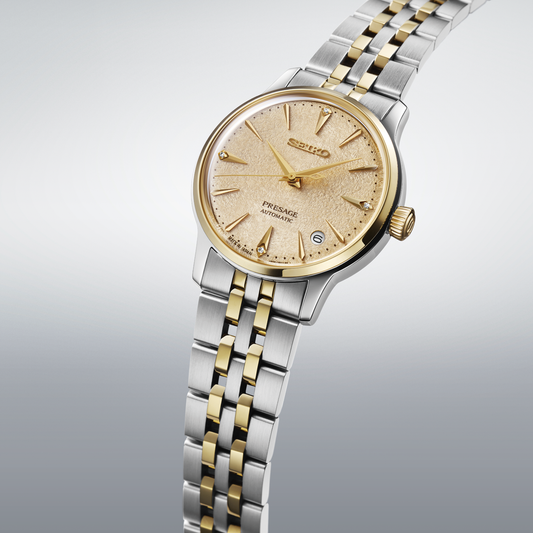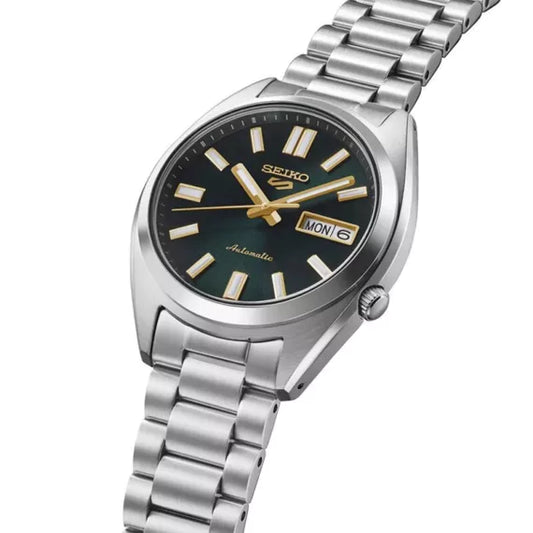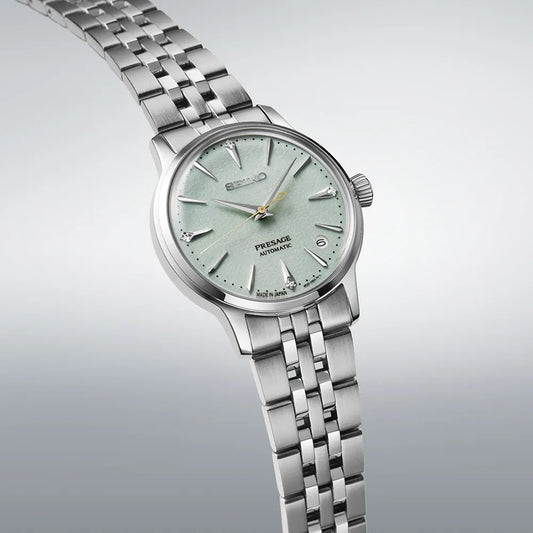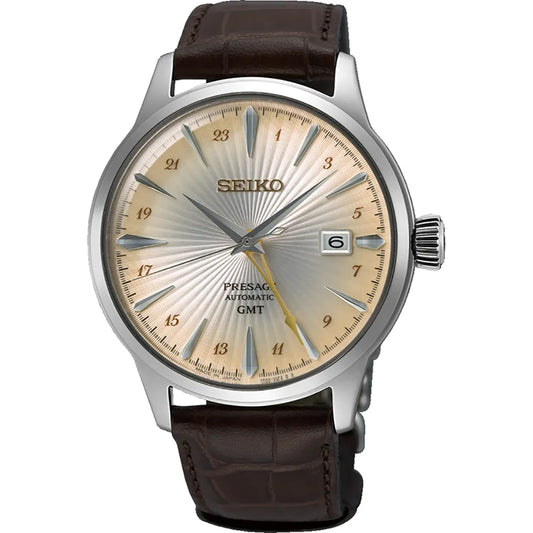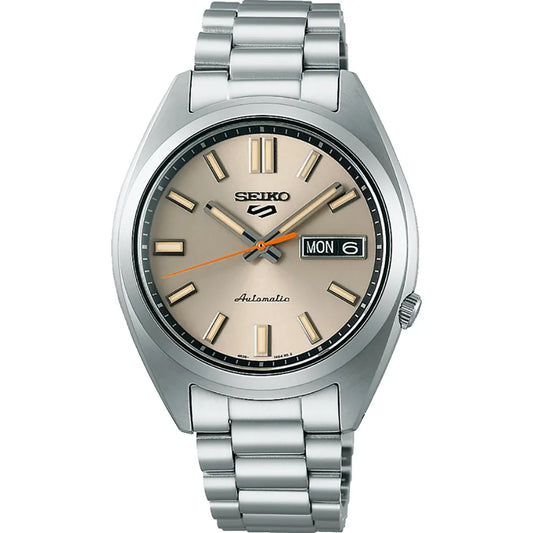Collection: Mechanical Watches

-

 Sold out
Sold outSeiko 5 Sports SRPD67K1 Men's Watch
Regular price €235,00 EURRegular priceUnit price / per€380,00 EURSale price €235,00 EURSold out -
Seiko 5 SNKE01K1 Watch
Regular price €199,00 EURRegular priceUnit price / per -
Seiko 5 SNKD99K1 Watch
Regular price €199,00 EURRegular priceUnit price / per -
Seiko 5 SNKL45K1 Watch
Regular price €189,00 EURRegular priceUnit price / per -
Seiko 5 SNKL41K1 Watch
Regular price €189,00 EURRegular priceUnit price / per -
Seiko watch Presage Automatic SRPL64J1
Regular price €640,00 EURRegular priceUnit price / per -
Seiko watch Presage Automatic SRPL61J1
Regular price €590,00 EURRegular priceUnit price / per -

 Sold out
Sold outSeiko Sea SRPL11K1 Prospex Watch
Regular price €650,00 EURRegular priceUnit price / per -
Seiko Sea Save the Ocean SRPE33K1 Prospex Watch
Regular price €650,00 EURRegular priceUnit price / per -
Seiko 5 Sports SSK033K1 Watch
Regular price €490,00 EURRegular priceUnit price / per -
Seiko 5 Sports SSK003K1 Watch
Regular price €490,00 EURRegular priceUnit price / per -

 Sold out
Sold outSeiko 5 Sports SSK001K1 Watch
Regular price €490,00 EURRegular priceUnit price / per -
Seiko 5 Sports SSK036K1 Watch
Regular price €470,00 EURRegular priceUnit price / per -
Seiko 5 Sports SRPL59K1 SNXS Series 'Gold Cufflinks' Watch
Regular price €400,00 EURRegular priceUnit price / per -
Seiko 5 Sports Automatic SRPL57K1 watch
Regular price €400,00 EURRegular priceUnit price / per -
Seiko 5 Sports Automatic SRPL55K1 watch
Regular price €400,00 EURRegular priceUnit price / per -
Seiko 5 Sports SRPK89K1 watch
Regular price €400,00 EURRegular priceUnit price / per -
Seiko 5 Sports SRPK87K1 Watch
Regular price €400,00 EURRegular priceUnit price / per -
Seiko 5 Sports SRPJ45K1 Watch
Regular price €340,00 EURRegular priceUnit price / per€0,00 EURSale price €340,00 EUR -
Seiko 5 Sports SRPH33K1 Watch
Regular price €350,00 EURRegular priceUnit price / per€0,00 EURSale price €350,00 EUR -
Seiko 5 Sports SRPD55K1 Watch
Regular price €310,00 EURRegular priceUnit price / per€0,00 EURSale price €310,00 EUR -
Seiko 5 Sports SRPD61K1 Watch
Regular price €310,00 EURRegular priceUnit price / per€0,00 EURSale price €310,00 EUR -
Seiko 5 Sports SRPG27K1 Watch
Regular price €310,00 EURRegular priceUnit price / per -
Seiko 5 Sports SRPG39K1 Watch
Regular price €310,00 EURRegular priceUnit price / per -
Seiko 5 Sports SRPJ85K1 Watch
Regular price €310,00 EURRegular priceUnit price / per -
Seiko Prospex SUN045P1 Sea Kinetic GMT 200M Diver Watch
Regular price €635,00 EURRegular priceUnit price / per€710,00 EURSale price €635,00 EURSale -
Seiko Presage cocktail ladies watch SRE018J1
Regular price €650,00 EURRegular priceUnit price / per -
Seiko Prospex SRPL53K1 PADI
Regular price €670,00 EURRegular priceUnit price / per -
Seiko Presage cocktail ladies watch SRPL63J1
Regular price €590,00 EURRegular priceUnit price / per -
Seiko Presage men's watch SRPK48J1
Regular price €545,00 EURRegular priceUnit price / per -
Seiko Presage men's watch SSK041J1
Regular price €600,00 EURRegular priceUnit price / per -
Seiko Presage men's watch SRPK46J1
Regular price €540,00 EURRegular priceUnit price / per -
Seiko Presage men's watch SSA441J1
Regular price €480,00 EURRegular priceUnit price / per -
Seiko 5 Sports SRPK91K1 Men's Watch
Regular price €400,00 EURRegular priceUnit price / per -
Seiko 5 Sports SSK035K1 Men's Watch
Regular price €490,00 EURRegular priceUnit price / per -
Seiko Prospex men's watch SRPD25K1
Regular price €432,00 EURRegular priceUnit price / per€480,00 EURSale price €432,00 EURSale
The Timeless Class of Mechanical Watches
A mechanical watch operates without a battery and relies entirely on pure mechanics. The energy source is a mainspring tensioned by movement or manually via the crown. This stored energy is then transferred to the movement via a system of gears and springs. The result is a reliable, accurate timekeeping system that functions completely autonomously.
There are two main types: hand-wound watches, where the wearer winds the mainspring themselves, and automatic watches , which wind themselves through wrist movement. Thanks to this self-sufficient system, a dead battery is never an issue. It contributes to both durability and ease of use, especially for those who value traditional watchmaking. The mechanical wristwatches we offer on our website are all automatic watches. You can also wind the mainspring manually in these watches.
The higher average price of a mechanical watch reflects the complexity of the production process. Each movement consists of dozens to hundreds of carefully calibrated components that are assembled with precision. This makes mechanical watches a testament to craftsmanship.
Mechanical timepieces are often considered durable investment pieces. Their longevity and timelessness mean they are often passed down from generation to generation. They combine technical sophistication with cultural heritage, offering more than just a way to tell time.
FAQ: Mechanical watches
What does mechanical clockwork mean?
A mechanical watch works with a mainspring and gears, without the use of electronics or a battery.
What is the difference between a mechanical and automatic watch?
An automatic watch is a type of mechanical watch that winds itself by wrist movement, while a manual watch is wound using the crown.
Does a mechanical watch have a battery?
No, a mechanical watch works without a battery and draws its energy from a tensioned spring.
How often should you wind a mechanical watch?
Usually daily, depending on the model, with an average power reserve of 36 to 48 hours.












